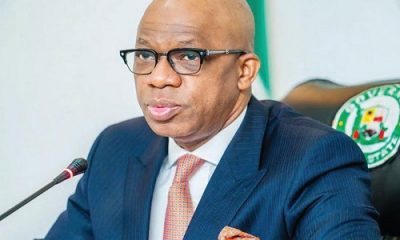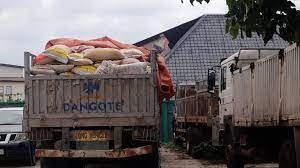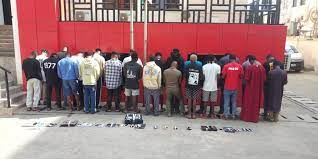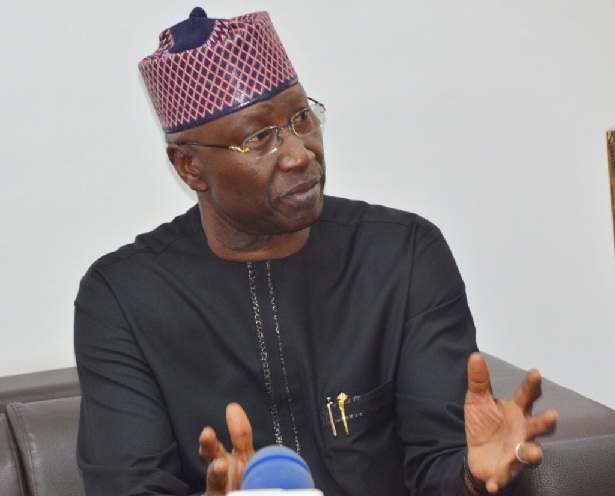NEWS
Buhari Swears – in Ministers, Creates Three New Ministries

By Mathew Dadiya, Abuja
At last, President Muhammadu Buhari Wednesday, inaugurated a new cabinet for his second term in office, three months after his inauguration on May 29, 2019.
The President commenced the event with the administering of oath of office on the reappointed Secretary to the Government of the Federation (SGF), Mr Boss Mustapha, and the 43 Ministers who are now part of the Federal Executive Council (FEC).
The swearing in ceremony took place at the Aso Council Chambers of the Presidential Villa with Vice-President Yemi Osinbajo, Senate President Ahmed Lawan; Deputy Speaker of House of Representatives, Idris Wase; All Progressives Congress (APC) national chairman, Adams Oshiomhole; and senior presidency officials in attendance.
It was also witnessed by family and friends of the new ministers; APC national leader, Bola Ahmed Tinubu; Governor Kayode Fayemi of Ekiti State; Governor Gboyega Oyetola of Osun State; the Chief of Defence Staff and military service chiefs, as well as the Inspector-General of Police.
Also present was the embattled Head of Service of the Federation, Mrs. Winifred Oyo-Ita, who is being investigated over an alleged N3billion fraud by the Economic and Financial Crimes Commission.
She had been absent from public functions in the past few days, particularly the induction retreat organised for the incoming ministers in Abuja, at which she was listed as one of the resource persons.
President Buhari in his remarks, charged the ministers to work closely and harmoniously with fellow cabinet members as well as with the Permanent Secretaries in their respective Ministries.
This, he said, has become necessary considering the fact that, the task of moving the country to the Next Level requires dedication, focus, and collective efforts.
He reminded them of his earlier charge to channel cabinet memos through the SGF and requests for meetings and presidential matters through his Chief of Staff, Abba Kyari.
Buhari warned that failure to follow appropriate vertical and horizontal channels of communication in the work of the cabinet among them would be sanctioned with requisite repercussions.
The President said: ”The core objectives of this Administration are to improve security, achieve diversified, inclusive economic growth and fight corruption. I am convinced that we can build a buoyant economy that supports inclusive growth and creates broad-based prosperity for every Nigerian – one that will absorb the two million Nigerians entering the labour market each year, as well as reduce the backlog of over 20 million unemployed or underemployed Nigerians.
”We must also intensify efforts to reduce internal security threats and eliminate corruption at all levels so as to ensure that our citizens have a safe and corruption-free environment where they can live and conduct their businesses, without fear and intimidation.
All these are only possible if we are relentless about delivering on the priorities that are vital to our overall objectives – and on the specific actions and targets that have been identified to guide policy direction and implementation as specified in our roadmap.
We have also agreed on the appropriate Key Performance Indicators and deliverables to be achieved in the road map on Government priorities – 2019 – 2023.
”I am pleased to note that at the end of the retreat, we have agreed and prioritized the key strategic initiatives required to drive socio-economic growth in our country, which must be accomplished, because the people of Nigeria expect nothing less from us.
”Our primary business over the next four years is to work together towards delivering the results that the people of Nigeria expect from us. We have a great opportunity as an Administration to build on the progress already made in order to fundamentally shift Nigeria’s trajectory on the path of steady growth and development.
”While recognizing the existing challenges, and the urgent need to surmount them, we must not fail to note the progress we have made since inception.
”Our economic policy, which is the Economic Recovery and Growth Plan, is still robust and on course with the necessary policies and initiatives to sustain the country’s exit from recession, engender growth and promote the value chain of infrastructural development. We believe that we can sustain our legacies and developmental strides if they are based on sustainable policies and good governance.”
While assigning portfolios to the Ministers, Buhari announced three new Ministries, namely Ministry of Police Affairs, which he had scrapped in 2015; Ministry of Special Duties and International Affairs; as well as Ministry of Humanitarian Affairs and Disaster Management.
The Ministers who were sworn-in in groups of fives and three, making a total of nine batches; were seven female and 36 male Ministers as screened and cleared by the Senate last month.
Meanwhile, a one-minute silence and special prayer were observed in honour of late Mr. Tijani Yusuf, the President’s Senior Special Assistant on General Duties, who died two weeks ago; before the new Ministers took a group photograph with the President.

The Ministers and their portfolios as announced by President Buhari at the ceremony are: Dr. Ikechukwu Ogah (State, Mines & Steel); Mohammed Musa Bello (FTC); Godswill Akpabio (Niger-Delta); Chris Ngige (Labour & Employment); Sharon Ikeazor (State, Environment); Adamu Adamu (Education); Maryam Katagun (State, Industry)
Timipre Sylva (State, Petroleum); George Akume (Special Duties); Mustapha Shehuri (State, Agriculture); Goddy Jedy Agba (State, Power); Festus Keyamo (State, Niger-Delta); Ogbonnaya Onu (Science); Osagie Ehanire (Health); Clement Ike (State, Budget); Richard Adebayo (Industry); Geoffrey Onyeama (Foreign Aff.); Ali Isa Pantami (Communication); Emeka Nwajiuba (State, Education); Suleiman Adamu (Water Res.)
Zainab Ahmed (Finance, Budget and National Planning); Muhammad Mahmood (Environment); Sabo Nanono (Agriculture); Bashir S. Magashi (Defence); Muhammad Buhari (Petroleum); Sen. Hadi Sirika (Aviation); Abubakar Malami (Justice); Ramatu Tijjani (State, FTC); Lai Mohammed (Information)
Gbemisola Saraki (State, Transport); Babatunde Fashola (Works & Housing); Adeleke Mamora (State, Health); Mohammed H. Abdullahi (State, Science & Tech.); Zubair Dada (State, Foreign Aff.); Olamilekan Adegbite (Mines & Steel); Tayo Alasoadura (State, Labour); Rauf Aregbesola (Interior); Sunday Dare (Youth & Sports); Paulen Talen (Women)
Rotimi Amaechi (Transport); Maigari Dingyadi (Police Aff.); Sale Mamman (Power); Abubakar D. Aliyu (State, Works & Housing); Sadiya Umar Faruk (Humanitarian, Disaster Management & Social Development).
NEWS
Tinubu Approves Management Unit for Health Sector Renewal Investment Initiative
President Bola Tinubu has approved the establishment of the Sector-wide Coordinating Office-Programme Management Unit (SCO-PMU) domiciled in the Office of the Coordinating Minister of Health and Social Welfare.A statement on Friday by his spokesman, Chief Ajuri Ngelale, said the unit would ensure efficient, transparent and accountable management of external grants mobilised towards the implementation of the Nigeria Health Sector Renewal Investment Initiative (NHSRII).
Ngelale said SCO-PMU would report to a Steering Committee/Ministerial Oversight Committee chaired by the Minister, including the Minister of State, Permanent Secretary; Ministry of Finance, Ministry of Budget and Economic Planning and relevant development partners. “The SCO-PMU will serve as the secretariat and delivery unit for the NHSRII and is to be headed by a national coordinator (NC).“The functions of the SCO-PMU include programme management, monitoring and evaluation, engagement and supervision of Independent Verification Agents (IVAs) for NHSRII programmes and fiduciary management, among others.“Consequently, the President has approved the appointment of Dr. Muntaqa Umar Sadiq as the National Coordinator of SCO-PMU,” he said.Report says that Sadiq has over 17 years of experience in public health, impact investing, investment banking, energy, and climate financing across the health, finance, climate and energy sectors.He had served as Head of the Performance Management and Delivery Unit at the Federal Ministry of Health and Social Welfare and Chief Executive Officer of the Private Sector Health Alliance of Nigeria.He also served as Head of the Nigeria Energy Transition Office and Private Sector Engagement Adviser at the World Bank. (NAN)
Education
FG Denies Slash in Students’ Allowances

The Federal Government says it has no plan to slash scholarship students’ allowances as recently projected in the media.The Minister of Education, Prof. Tahir Mamman, stated this during a meeting with the leadership of the National Association of Nigerian Students (NANS) in Abuja on Friday.
Report says that there was a report that the ministry, through the Federal Scholarship Board, announced a slash in allowances of foreign scholars stranded in Russia, Morocco, and Algeria among others.
The slash in scholars’ allowances under the federal government’s Bilateral Educational Agreement Scholarship (BEA) was attributed to the economic crises.Mamman said that there was no slash in scholars` allowances but rather an adjustment due to Foreign Exchange fluctuations (FOREX).“We want to clarify what has been in the media on allowances paid to scholars under the Bilateral Scholarship Agreement.“We want to place it on record that the ministry and the Federal Government for that matter have not slashed the allowances due to students.“What happened is some adjustments in the amount due to them because of FOREX fluctuations, and as soon as we get the balance we have applied for, we will pay them.“But for now, what is in the budget is what we can pay. So, there is no slash, we will even be happy to increase, so this is what has led to the adjustments,” he said.(NAN)NEWS
Planned Protests: CAN calls for calm and patience

By Laide Akinboade, Abuja
The Christian Association of Nigeria, CAN, on Friday, has urged Nigerians to calm and patient with Federal Government and should give the the government more time to address these pressing concerns.In a statement issued by CAN and signed by Archbishop Daniel Okoh ,President, CAN and made available to journalists in Abuja.
CAN also urged all Nigerians to consider alternative means of expressing their grievances. He however said CAN stands in solidarity with the citizens of nation during these challenging times of economic hardship and pervasive hunger. The statement reads in part, “As we navigate this period of crisis, it is imperative to uphold the constitutional rights of every Nigerian to peacefully protest and express their grievances. The right to assemble and voice discontent is a cornerstone of our democracy and must be protected and respected by all. Peaceful protests are a powerful tool for civic engagement, allowing the populace to communicate their concerns and hold leaders accountable. However, the anxiety related to the impending protests is heightening, especially given the volatile experiences in countries like Kenya and Pakistan.”We must also draw from our recent history. The #ENDSARS and #RevolutionNow protests, though rooted in genuine grievances, were marred by tragic incidents where miscreants hijacked the process. This led to widespread looting, destruction of properties, and unfortunate loss of lives. These experiences have shown us that mass demonstrations can quickly degenerate into chaos if not properly managed and coordinated.” In light of the planned protests scheduled to commence on 1st of August, CAN urges all Nigerians to consider alternative means of expressing their grievances. We recommend giving the government more time to address these pressing concerns. This period should be used to explore other legal avenues that will not easily give hoodlums the opportunity to hijack the exercise to destroy our national assets or endanger lives and properties. Dialogue, petitions, and town hall meetings are viable options that can yield positive results without the risk of disorder.”We call on the government to cut the cost of governance and expedite its efforts to alleviate the hardships in the land. The opulent lifestyle of political office holders must be addressed to demonstrate the sincerity of those in government to improve the living conditions of the people. Likewise, it is imperative that the government implements the newly approved national minimum wage to provide immediate relief to struggling families.”Furthermore, specific measures must be taken to put an end to kidnappings, banditry, and mass killings that have plagued various parts of our country. The security and well-being of every Nigerian should be paramount, and urgent action is required to restore peace and order.”We also call on the government to expedite its efforts to alleviate the hardships in the land. There is an urgent need for more refined and effective policies that address the root causes of the economic challenges we face. The government must deepen its consultations with stakeholders, including religious leaders, to create a more inclusive and comprehensive approach to problem-solving. By working together, we can devise sustainable solutions that reflect the needs and aspirations of the people.”In these trying times, let us all remember the words of our Lord Jesus Christ: “Blessed are the peacemakers, for they shall be called the children of God” (Matthew 5:9). As we seek to bring about positive change, let us do so with a spirit of peace, love, and unity. Our strength lies in our ability to come together, support one another, and work collectively toward a better Nigeria.”We pray for wisdom and discernment for our leaders, resilience and hope for our citizens, and divine intervention to guide us through these difficult times”.




















